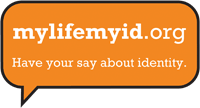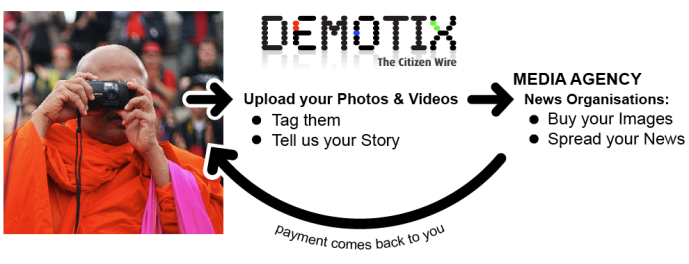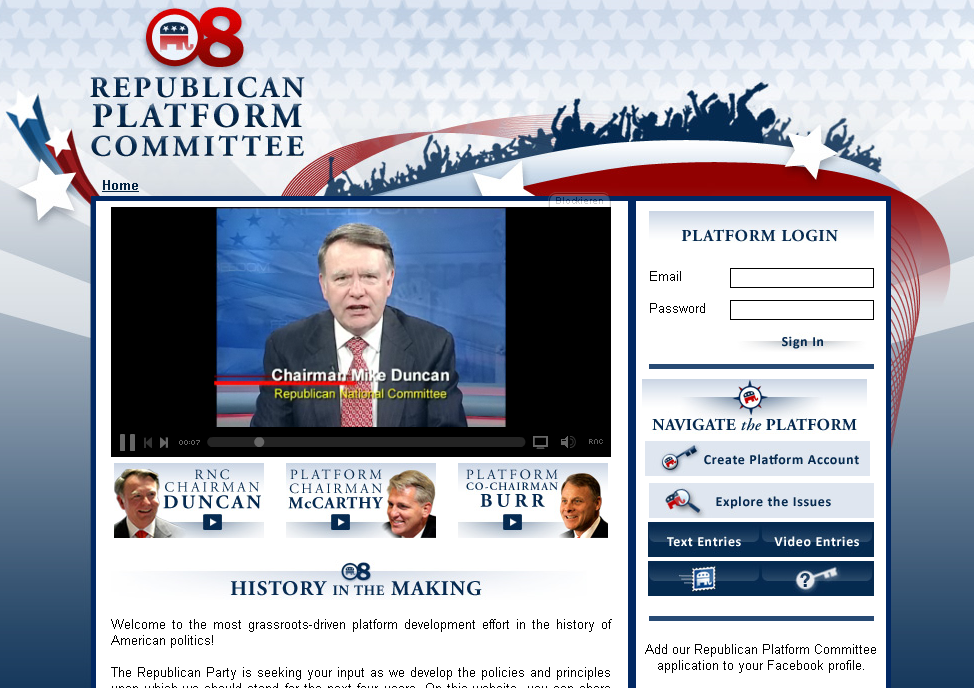Archive for July, 2008
 |
29. July 2008 – 08:42 by Bengt Feil
|
Almost all eParticipation projects are combinations of social methods and some sort of web based technology. At the BerlininJuly summit 2008 we discussed the aspect of open source technology for eParticipation which lead to some interesting thoughts and conclusions.
In many cases the persons developing these technologies want to share their ideas and advances with the greater eParticipation community. To do so some of them publish the work as open source projects which can be reused under some sort of open licence like the GPL. There are different ways to store the actual code of the software and manage open source projects from the technical side like Sourceforge or Google Code. These services do their job extremely well but they are scattered around the net and not specifically aimed at the topic of eParticipation.
On the other hand organizations looking into using eParticipation tools and methods are often confronted with the problem that they need to develop both the method and the technology needed and are not aware of already existing open source projects offering a solution. As a result many technologies are reinvented in different countries and different contexts even so the fitting technology would have been available. Read the rest of this entry »
Posted in Projects | 9 Comments »
 |
24. July 2008 – 13:41 by Bengt Feil
|

As the German adaption of the new version of the Creative Commons licences has been launched today I would like to take a look at what is new about version 3.0. Creative Commons is in short to legally share, remix and reuse creative content or in the words of CC itself:
Creative Commons provides free tools that let authors, scientists, artists, and educators easily mark their creative work with the freedoms they want it to carry. You can use CC to change your copyright terms from “All Rights Reserved” to “Some Rights Reserved.”
Creative Commons is used for many different kinds of media and works all over the web. To get an overview about how variable CC is take a look at the case studies. It is very easy to get a work licensed under creative commons as the organisation provides a tool to help you choose the right licence and easy to understand graphical representations of the rights granted.
In version 3.0 a number of improvements were made to make the CC licences even easier to use and applicable in more different situations:
- The “generic” licence was separated from the US licence and is now known as the “unported” licence which can be translated and ported to every language.
- Harmonization of the treatment of moral rights & collecting society royalties to make to commonly acceptable and consistent.
- The no endorsement language has been made explicit to prevent any person to misuse the attribution requirement of a CC license to improperly assert or imply an association or relationship with the licensor or author.
- It has been made easier to “ensure that there are no legal barriers to people being able to remix creativity in the way that flexible licenses are intended to enable.”
Of course the process of revising the CC licences has been open to everyone who wanted to take part. The organisation used a mailing list to handle the discussion. I think that eParticipation by such a forward looking and innovative organisation could have been a little more sophisticated.
This evolution of the CC licences is no huge leap but fits the sentiments connected to the legal questions of copyright and in summary Creative Commons is clearly one of the most innovative and important organisations out there.
Posted in News | 1 Comment »
 |
23. July 2008 – 11:52 by Rolf Luehrs
|

The UK is about to introduce identity cards from next year on. This introduction is part of the Government’s National Identity Scheme, which RT HON Jacqui Schmith MP, Home Secretary, believes to
“give us all a new way to protect ourselves and our families against identity fraud, and to protect our communities against crime, illegal immigration and terrorism. And it will help us to prove our identity in the course of our daily lives- when travelling, for example, or opening a bank account, or applying for a new job, or accessing government services.”
Needless to mention that there are a lot of different views and concerns regarding the collection and control of personal data by the government and this might be the reason why the Home Office started a consultation process on the proposals.
“I very much welcome your views on these, as well as on other aspects of our implementation plans. The conversation which begins now with a wide constituency of stakeholders will enable us to take on a broad range of experiences and ideas for defining services so that we can best meet public needs and deliver benefits” Jacqui Smith points out in her foreword to the “Delivery Plan 2008” (pdf).
Data protection activists and identity card opponents might have had the impression that this consultation process is not at all concerned with general question whether or not an identity card would be useful but just on the exact terms of the implementation. This would of cause not prevent anybody to object against the identity card at the first opportunity.
This opportunity came when the Home Office launched a “specially designed website” to discuss the national identity scheme with young people at MyLifeMyId.org. Read the rest of this entry »
Posted in News, Projects, Tools | 7 Comments »
 |
22. July 2008 – 16:37 by Rolf Luehrs
|
PEP-NET welcomes five new associate members (in alphabetical order):
Asociación Ciudades Kyosei
The spanish-based association, the “Asociación Ciudades Kyosei” aims to provide a free non-partisan environment to foster municipal civic participation. NGOs, citizens, civil servants, politicians & media will be provided with tools to communicate, discuss, carry out participatory processes, coordinate internal work, etc. This environment, whose name is Kyosei-Polis, will provide e-Participation tools to any organization -first of all: public authorities- willing to involve citizens to work for the “common good”.
Center for E-Government - Danube University Krems
The Centre for E-Government at the Danube Unvierstiy Krems,Austria is a leading Austrian competence centre for education in E-Government and related disciplines, including law, organisational theory and information technology.We focus on post-graduate education and
reaserch in the areas within and related to E-Government.
The centre for E-Government has been conducting research in the area of eParticipation for a number of years, including the following projects:
- Youth Participation Project mitmachen.at
- Youth Participatin Project jugend2help.gv.at (ongoing)
- Enhancing Western Balkan e-Government Expertise (ongoing)
- Responsible for the Working Group E-Democracy and E-Particiaption at
- the Austrian Chancellery
Gov2U
Gov2U was conceived and founded in 2005 as a non-profit, non-
governmental organization by a group of visionary professionals from
the fields of Legislative Information and Communication Technology
(ICT) and community activism aiming to develop tools that facilitate
the everyday work of elected officials and that offer citizens a
greater stake in political discourse by enabling them to contribute
their ideas, suggestions, and opinions.
International Teledemocracy Centre, Napier University (ITC)
Working closely with governments, parliaments and NGOs across Europe and worldwide, ITC has established an international reputation as a research centre that combines relevant software engineering applications with political and sociological analysis.
ITCs remit is to research and apply information and communication technologies to enhance and support the democratic decision-making processes.
Public-i
Public-i is a privately owned company focused on democratic engagement and advise Local Authorities on the effective use of multimedia and webcasting. Public-i helps Local Authorities in 8 European countries to create and deliver audiovisual content that really makes an impact in the local
community.
In case your organisation considers a PEP-NET membership as well, please do not hesitate to contact us. Just drop us a note (luehrs@pep-net.eu or feil@pep-net.eu ) and we will contact you soon.
Posted in News, members | 1 Comment »
 |
21. July 2008 – 15:56 by christophdowe-politik-digital.de
|
On July 17th and 18th, the BerlinInJuly un-conference on eDemocracy concregated 35 eDemocracy professionals from about a dozen countries to communicate about their field of acticity. Organized by politik-digital.de, Tom Steinberg of mysociety.com, and Christian Heise of e-demokratie.org / e-politik.de the conference took place in the premises of one of its partners, namely the British Council Berlin.

The aim was to give the attendees a chance to do some networking or even start new projects. Topics such as project funding generated lively discussions about good and bad practice in eDemocracy. In this case, a special trick by abgeordnetenwatch.de attracted some interest: By clicking away the google ads, the user starts a clock telling him how much he/she is costing the site makers to make him/her donate a little money.
Another discussion topic was motivating people and politicians for eParticipation. Users can be attracted by small gimmicks such as flash games, as Ben Whitnall of Delib from the UK explained. With politicians it’s harder, but dutch Arend Zwaneveld of maildepolitiek.nl showed that it is possible by convincing them in rational ways.
While most of the attendees came from western europe and north america, Adrian Moraru from Romania and lebanese Ayman Mhanna could tell about some quite unfamiliar circumstances. In the end, everybody agreed about the necessity of networking for eDemocracy, planning to come back next year.
A list of attendees and first outcomes can be viewed on the conference-wiki.
Finn Kirchner, politik-digital.de / pol-di.net e.V.
Posted in News, Visions | 3 Comments »
 |
16. July 2008 – 09:02 by Rolf Luehrs
|
Getting rich while making the world a better place - this could be the mission of DEMOTIX Ltd. The company aims to be the first citizen wire, selling citizens generated photos & news to established media agencies.

The mission and business idea is based on the analysis that
- Only four US newspapers have foreign news desks (the NY Times, LA Times, the Washington Post, and the Wall Street Journal), and there are only 141 US foreign correspondents currently working today (in print /and/ broadcast media)
- In the UK, a 2006 study of the broadsheets showed that more than 50% of the news was directly attributable to press releases
- The world’s media (over 90%) relies on the wire services – the Associated Press and Reuters – for their news. But some 80 countries, or 40% of the world’s nations, have no bureau from either agency.
DEMOTIX wants to close this gap by hosting citizen made photos, news and stories from all over the world on their website, trying to sell this stuff to mainstream media. The company keeps 50% of the revenues while passing on the other half to the authors.
Don’t know whether this will work, but I like the concept. What I do not like that much is that the people behind it stay almost anonymous. In the “about us” section nothing is said about who owns and leads the company.

It seems also a little exaggerated to hold out the prospects that participants will have the chance to earn up to 100.000 $ for exclusive material. How often will that be the case? Finally I recommend to read the terms of business carefully - although the company claims that the authors will retain the copyright, I am not quite sure if this is really the case.
It is, however, an interesting experiment and I am curious to see if DEMOTIX can make it.
Posted in News, Trends | 1 Comment »
 |
16. July 2008 – 09:00 by Bengt Feil
|
On Wednesday June 9th we started the hot phase of the project BOP. This project aims at transferring the process of formal participation in urban planning to the internet. This kind of participation is mandatory in Germany – Every urban land-use plan etc. has to be public and the stakeholders relevant to this plan as well as citizens are asked to state their opinion. „Bauleitplanung Online – Pilot (BOP)“ employs an online participation platform to transfer the offline process of formal participation in urban planning to the web. Since Wednesday this platform is live and in use by the involved parties.

The project was commissioned by the City of Hamburg and is organized as a pilot case. The goal of this pilot process is to identify the requirements, wishes and expectations which all involved parties have towards an internet based participation process in urban planning. This will lead to further development of the process as well as to the integration in the IT-infrastructure of the whole city region.
Read the rest of this entry »
Posted in Projects | 1 Comment »
 |
15. July 2008 – 10:48 by Bengt Feil
|
The American Republican Party (GOP) launched a site to gather comments and suggestions on policy issues by its supporters. The website is called Republican Platform Committee and allows everybody who is willing to register can participate in what the party describes as:
…seeking your input as we develop the policies and principles upon which we should stand for the next four years. On this website, you can share your thoughts, participate in polls, and communicate directly with the policymakers who will be shaping the party’s agenda. All comments and feedback will be reviewed and taken into full consideration as we prepare for our convention in Minneapolis-St. Paul.
Techcrunch points out that among the topics suggested, e.g. national security, energy and gas prices, health care reform, judicial nominations, “Protecting American Values.” there is no specific mentioning of tech related topics on the website which would be a perfect fit for the medium. As an additional way to reach out to interested citizens the GOP also launched a Facebook app aimed at the same purpose. The site uses text and video based communication as well as polls to discuss the topics at hand and is moderated.

The old elephant GOP seems to be quite up to date when it comes to modern campaigning. One may hope that such a step towards eParticipation will also be part of the federal government program regardless who wins the election. As far as campaigning goes: This effort may help to convert the Ron Paul enthusiast to John McCain if he is smart enough to use this tool and pick up the right topics. I think the Democrats will have to introduce answer to this soon and their already made good steps towards it with BarackObama.com.
Posted in News | No Comments »
 |
11. July 2008 – 09:53 by Rolf Luehrs
|
As experiences from the City of Hamburg (Germany) show, urban planning is one of the favoured topics for citizen participation on the Internet. It is a field where the strengths of eParticipation can be displayed to best advantage: relevant information, including geographical data, can be provided and displayed visually; results-oriented debates with hundreds of active participants can be held; lay people and experts as well as decision-makers and those affected by the decisions can be brought together. Thus original ideas can be developed and implemented, citizens involved actively in the structuring of their urban environment and, in the medium term, tangible value created.
“It is lovely to live by the water, but living on the water is better still, and it is affordable on a floating home. Major cities such as San Francisco, Seattle, Vancouver, London and Amsterdam have made many people’s dreams come true. The floating homes in these cities are both an enrichment of the cityscape and a tourist attraction.”
Anne struck a chord with her contribution to the Internet debate on “Hamburg, a growing city” (2002): many people would love to be able to live right on the water. But it was not only potential future tenants whose imagination was caught by the idea; urban planners, architects, local politicians and the city’s mayor, Ole von Beust, were fascinated, too. In early 2003, the idea was chosen by a jury and recommended for implementation.
Life on the water
Since then, various prototypes for living on the water have been developed, suitable moorings sought and work done on the many problems associated with developing waterways for residential use. Even though, five years after the Internet debate, the project still has not been put into practice, the developments are encouraging. Current plans envisage a floating string of contiguous residential locations in the tidal basin and along the river Bille in the east of Hamburg which it is hoped will engender a community of water dwellers and a floating lifeline. A survey by the Förster Trabitsch architectural practice anticipates economic benefits from the project in addition to impulses for urban development and planning: “Here new kinds of local amenities can emerge which, as part of an overall concept, would foster new jobs and attractions. Floating cafes, studios, gardens, shops and markets are all possible extensions of the idea.”

For the City of Hamburg, the discussion of the “growing city” principle also marked the start of a whole series of Internet discussions in which Hamburg’s Senate or its parliament enabled citizens to have their say. Read the rest of this entry »
Posted in Projects, good practice | 2 Comments »
 |
10. July 2008 – 20:25 by Fraser Henderson - ICELE
|
The Department for Communities and Local Government in the UK has recently released a new white paper on community empowerment. This White Paper sets out concrete proposals for areas where both central and local UK government can devolve more power to citizens – giving local communities the power to drive real improvements in everything from the way their neighbourhoods are policed to the way that community assets are used.
The paper hinges on the theory that ”while people want to have a greater say, they need also to be convinced that their involvement will make a difference. If they speak up, they want to know that their voices will be heard. This is what empowerment is all about – passing more and more political power to more and more people through every practical means”
My take is that “empowerment” only works if the recipient is ready, able and willing to accept it. Furthermore the notion that it is a “gift” from government is a bit archaic; power should be ‘taken’ by the community for there to be any effective consequence.
The paper does come out with a good set of actions, however. For example:-
- a duty to promote democracy to all councils (with the suggested use of blogs, podcasts and interactive websites)
- Grassroots grants” for third sector organisations
- a new duty to respond to petitions and if 5% of the local population sign then there has to be a full council debate
- petitions in other areas of public service
- all authorities encouraged to have participatory budgeting by 2012
- a call for local mayors to be directly elected
- a network of “digital inclusion advisers” who will work directly with individual local authorities and their partners and the launch of a “digital equality action plan”
- funding for media and technology (but no co-ordinating unit!)
- a digital mentor scheme in deprived areas
- the power to provide incentives for voting (e.g. prize-draw)
Sadly the digital angle is still lacking. For example, there is no duty on the use of “e”petitions and the advantages of social networking, collaberative legislation making, technologies for PB and online voter awareness are underplayed.
Alas, eParticipation remains underground for now….
Posted in News, Trends | 2 Comments »















